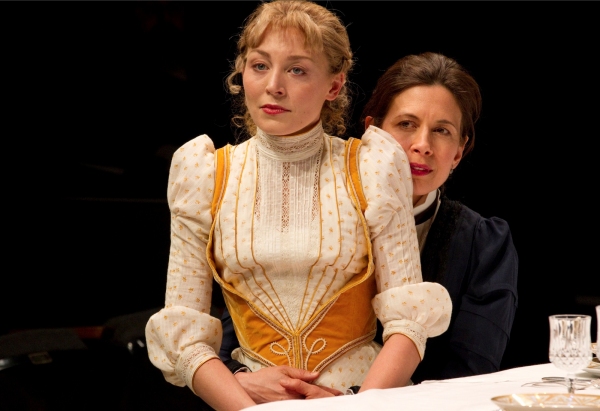“The desire not to destroy the palace but to move into it oneself has always been the occupational curse of revolutionaries.”
Wilfrid Sheed, “Writers’ Politics”
Archives for February 2011
CAAF: The worst houseguests in the world
In 1822, Leigh Hunt, his pregnant wife and their six children moved into the ground floor of Lord Byron’s house in Pisa. As one scholar notes, “the [Hunt] children were encouraged to express their personalities rather than to submit to discipline.” Byron put it more colorfully, referring to the kids as “six little blackguards.”
But it’s Marianne Hunt’s own record of the stay that makes me laugh. From an 1822 diary entry:
Mr. Hunt was much annoyed by Lord Byron behaving so meanly about the Children disfiguring his house, which his nobleship chose to very severe upon. How much I wish I could esteem him more! It is so painful, to be under any obligation to a person you cannot esteem! Can anything be more absurd than a peer of the realm–and a poet–making such a fuss about three or four children disfiguring the walls of a few rooms. The very children would blush for him, fye Lord B.–fye.
Such a fuss about the disfigurement of only a few rooms! Fye!
CAAF: From Chekhov’s notebooks
Instead of sheets–dirty tablecloths.
The dog walked in the street and was ashamed of its crooked legs.
They were mineral water bottles with preserved cherries in them.
In the bill preserved by the hotel-keeper was, among other things: “Bugs–fifteen kopecks.”
He picked his teeth and put the toothpick back into the glass.
A private room in a restaurant. A rich man, tying his napkin round his neck, touching the sturgeon with his fork: “At least I’ll have a snack before I die”–and he has been saying this for a long time, daily.
If you wish women to love you, be original, I know a man who used to wear felt boots summer and winter, and women fell in love with him.
Entries quoted by James Wood in his essay “What Chekhov Meant By Life,” from The Broken Estate.
TT: Almanac
“It had always been a notion of mine that sanity is like a clearing in the jungle where the humans agree to meet from time to time and behave in certain fixed ways that even a baboon could master, like Englishmen dressing for dinner in the tropics.”
Wilfrid Sheed, In Love with Daylight
TT: The double nickel
I turned fifty-five on Sunday. Fifty-five was old when I was a boy. People back then used to settle into old age more quickly and, I think, somewhat more willingly. Now it’s the least noteworthy of landmarks–except for today’s demographers, who know it as the near side of the baby boom.
I read a sobering piece the other day about how boomers are so reluctant to admit the fact of their inexorably increasing age that marketers have been forced to accommodate them by resorting to what can only be described as systematic euphemism:
The generation that sent diaper sales soaring in the 1960s, bought power suits in the 1980s and indulged in luxury cars in the 2000s is getting ready to retire: The oldest boomers turn 65 this year. To accommodate their best customers’ needs, American companies are overhauling product lines, changing their marketing and redesigning store layouts.
But there’s a catch: Baby boomers, famously demanding and rebellious, don’t want anyone suggesting they’re old.
“We don’t do anything to remind boomers that they are getting older,” says Ken Romanzi, North America chief operating officer at Ocean Spray Cranberries Inc., which has targeted the health-conscious generation as its primary consumer base….
Bathroom-fixture maker Kohler Co. struggled to come up with a more palatable word for “grab bar,” which boomers resist. It introduced the “Belay” shower handrail–named for the rock-climbing technique–which blends subtly into the wall of a tiled shower. “When you say, ‘We’ve got beautiful grab bars,’ [boomers] just say, ‘Naw,’ because they don’t want to identify as needing that,” says Diana Schrage, senior interior designer at Kohler’s design center.
 I suppose I shouldn’t be too terribly surprised that a generation that grew up singing I hope I die before I get old has started to succumb to such undignified terror, though I may well find myself similarly disposed a decade from now. For the moment I’m perfectly delighted to be fifty-five, partly because I didn’t expect to make it here five years ago and partly because my life since then has been a more or less nonstop adventure.
I suppose I shouldn’t be too terribly surprised that a generation that grew up singing I hope I die before I get old has started to succumb to such undignified terror, though I may well find myself similarly disposed a decade from now. For the moment I’m perfectly delighted to be fifty-five, partly because I didn’t expect to make it here five years ago and partly because my life since then has been a more or less nonstop adventure.
Regular readers of this blog won’t need to be told what I’ve been up to, but if you’re dropping in for the first time, here’s a capsule guide to current events:
• My first opera libretto was successfully premiered by a major company a year and a half ago, and my second one will be produced in April.
• I published a best-selling biography a year ago and am now hard at work on what I hope will be an equally well-received sequel.
• I just wrote and directed my first play, and got the idea for another one a couple of days ago.
• On top of all this, I have the best day job in the world, and five years ago I met the woman who is now my wife.
Mrs. T, as it happens, is my near-coeval–she’s four days younger than me–and we plan to celebrate our dual birthdays and good fortune in an appropriate manner later this week.
I flew up to New York on Saturday morning to see a new play about a middle-aged WASP. I had lunch with a new friend and dinner with an old one, both of whom assured me that the best is yet to come. I certainly hope so, but I don’t see how it could be much better than the last five years have been.
I’m a lucky guy, married to a lucky gal. May our luck hold.
* * *
The Who play “My Generation” at Woodstock in 1969:
TT: Almanac
“I rail against writers who talk about the loneliness of it all–what do they want, a crowd looking over their typewriters? Or those who talk about having to stare at a blank page–do they want someone to write on it?
Wilfrid Sheed, interview, New York Times, Aug. 2, 1987
TT: The saddest story
Today’s Wall Street Journal is devoted in its entirety to a review of the new off-Broadway production of Three Sisters. Here’s an excerpt.
* * *
In Ira Gershwin’s lyric for “But Not for Me,” a heartsick postmistress declares that love has brought her “more clouds of gray/Than any Russian play/Could guarantee.” If I had to guess, I’d say that the lady in question had “Three Sisters” in mind. Few plays are more depressing than Anton Chekhov’s soft-spoken study of a turn-of-the-century trio of provincial Russian women who long for the bright lights of Moscow but are forced to settle for ordinary small-town lives that bring them little in the way of joy. What makes their story endurable is the lightness of touch with which Chekhov tells it–which is also what makes it so agonizing to see their remaining hopes dissolve at play’s end.
 The sisters’ tale is, of course, characteristically Russian in its jarringly close juxtaposition of comedy and heartbreak, and that is what poses the biggest difficulty to present-day interpreters: How do you make a play written in pre-revolutionary Russia in 1900 work in America in 2011? In the Classic Stage Company’s new Off-Broadway production, Austin Pendleton is taking the same tack that he took two years ago in that company’s “Uncle Vanya,” which is to toss a group of modern-sounding actors into a traditional-looking setting and see what happens. The results are once again interesting but very uneven, though not so much as to keep Chekhov’s great play from making its heart-breaking effect.
The sisters’ tale is, of course, characteristically Russian in its jarringly close juxtaposition of comedy and heartbreak, and that is what poses the biggest difficulty to present-day interpreters: How do you make a play written in pre-revolutionary Russia in 1900 work in America in 2011? In the Classic Stage Company’s new Off-Broadway production, Austin Pendleton is taking the same tack that he took two years ago in that company’s “Uncle Vanya,” which is to toss a group of modern-sounding actors into a traditional-looking setting and see what happens. The results are once again interesting but very uneven, though not so much as to keep Chekhov’s great play from making its heart-breaking effect.
Mr. Pendleton’s cast is full of familiar faces, some of whom also appeared in his “Uncle Vanya.” The sisters are Maggie Gyllenhaal, Jessica Hecht, and Juliet Rylance, and of them it is Ms. Rylance who is most memorable. Her warm, throaty alto and utterly sincere demeanor are just right for Irina, the youngest and least disillusioned of the three sisters. Ms. Hecht also gives a strong and believable performance as the careworn Olga. Not so Ms. Gyllenhaal, a talented performer who is as wrongly cast here as she was in “Uncle Vanya,” and for much the same reason: Her demeanor and voice are so obviously contemporary as to jolt the eye and ear….
* * *
Read the whole thing here.
TT: Neither does he spin
Wilfrid Sheed, who was (almost) as good a novelist as he was a critic, died two weeks ago. In his honor, I’ve devoted my “Sightings” column in today’s Wall Street Journal to his best novel, Max Jamison. Here’s an excerpt.
* * *
“Never pay any attention to what critics say,” Jean Sibelius once told a fellow composer. “Remember, a statue has never been set up in honor of a critic!” The members of my unhallowed profession have, however, been portrayed in many novels, plays and movies, and most of those portrayals have been pretty nasty. From Addison DeWitt in “All About Eve” to Anton Ego in “Ratatouille,” fictional critics tend as a rule to be snide, venal and, above all all, creatively impotent. What’s more, you get the definite feeling that they loathe themselves for being unable to do that of which they write. As DeWitt puts it with self-lacerating hauteur, “My native habitat is the theater. In it I toil not, neither do I spin.”
 I won’t say that these portrayals are totally unfair. (In fact, I won’t even say they’re mostly unfair, but that’s another column.) I do, however, want to draw your attention to a very different kind of portrait, one that was, logically enough, written by a very different kind of critic. Wilfrid Sheed, who died the other day, was a greatly talented novelist who ended up being better known as a critic, in which capacity he was also formidably gifted. But if there’s any justice in this world, Mr. Sheed will remembered longest for “Max Jamison,” the 1970 novel in which he brought off the seemingly impossible feat of making a drama critic look quite a bit like a human being.
I won’t say that these portrayals are totally unfair. (In fact, I won’t even say they’re mostly unfair, but that’s another column.) I do, however, want to draw your attention to a very different kind of portrait, one that was, logically enough, written by a very different kind of critic. Wilfrid Sheed, who died the other day, was a greatly talented novelist who ended up being better known as a critic, in which capacity he was also formidably gifted. But if there’s any justice in this world, Mr. Sheed will remembered longest for “Max Jamison,” the 1970 novel in which he brought off the seemingly impossible feat of making a drama critic look quite a bit like a human being.
The title character of “Max Jamison” is a New York critic with two strings to his bow. He writes about film for a highbrow quarterly and theater for Now, an imaginary weekly newsmagazine that bears a not-so-coincidental resemblance to Time (just as Max himself bears a surface resemblance to John Simon, though Mr. Sheed vehemently denied that Mr. Simon was his model). Max is, in his own words, “a son of a bitch in an imperfect world” who has grown weary of “the dreary business of accreting an opinion.” He is also desperately and comprehensively unhappy, having had two marriages blow up under him, and as the book begins, he is teetering on the edge of a full-blown midlife crisis, the kind where you chase after much younger women and hear poisonously snippy voices in the night.
Max is also–and this is the point of the novel–a man of impeccably cultivated taste who is tortured by the increasing tastelessness of the world around him, and who expresses his exasperation in one- and two-liners that go off in nearly every paragraph, leaving gaping holes wherever they explode….
* * *
Read the whole thing here.
